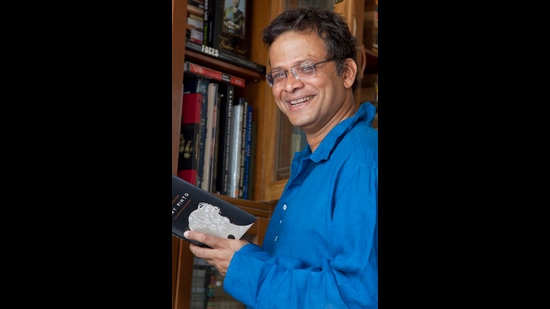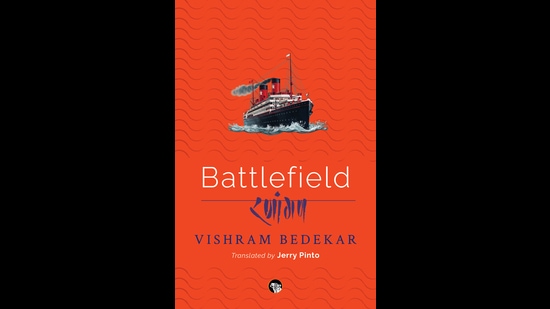
What was your first impression of Ranaangan?
I read it many years ago and what remained was its effortless cosmopolitanism, acute sense of fascism’s dangers, and prescience.
When did you decide to translate it?
I suppose one falls in love with a book. The difference is that there is no feeling of “Mine, mine, mine”; instead, the feeling is “Ours, this should belong to more of us.” That’s when I set aside my writing and give priority to the voice of another writer.
At the launch of Ranaangan, you said that it’s a book we should all read — and not just because you translated it. What makes it so compelling?
Ranaangan came out in 1939. It deals with the horrors of othering, how you can turn a whole community into the ‘Other’, how you can treat them brutally and end up carrying the guilt of that treatment, as a society, as a nation. These processes end up hurting both sides. That’s why I think it’s a book we all need to read. I believe that each choice we make as individuals — whether it is a joke we crack, a news item we refuse to read or an event that we try to explain away — brings us closer and closer to the inflection point.

How was the novel received when it was published?
I believe it was well-received, but there was a measure of bewilderment about that reception. The form of the novel was so different. It took in diary entries, fables, letters, flashbacks, surreal dance sequences and it took place aboard a ship — a capsule of time and space where anything could happen. Like a German woman and Marathi man falling in love.
What place does the book have in the Marathi literary canon today?
The book is canonical, but it occupies its own space. It does not sit with any other books. The new form that it suggested was not picked up afterwards. But its place is assured; it is still read widely.
What was Vishram Bedekar’s engagement with the politics of the day when he wrote the novel?
Instead of interrogating a long-dead author, we can look to his novel for answers.
Here is Chakradhar, a Marathi man, falling in love with Herta, a European woman. He has been in love before and had his heart broken. She has loved before and had her love wrested from her by the Nazis. They cling together for the short, sea-soothed span of 10 days, and then the tugboat arrives from the harbour.
Bedekar speaks from several interiorities. He offers a first-person account of what it must be like to be Jewish in a nation that denies them the ordinary pleasures of citizenship: Jews could not sit on park benches, for instance, and like African-Americans of the time in the USA, could not use toilets that non-Jewish Germans used. Bedekar inhabits the person of Chakradhar, who listens quietly to Indians debating nationalism.
The book has a multicultural milieu that seems apt for English. How does the author depict this milieu in the Marathi original?
The Marathi that Bedekar uses is what one might call Punekar Marathi. It is the Marathi that Narayan Surve (whose poems I am working on) would call with a certain measure of uneasy affection, Saraswat Marathi. But here’s the thing. Chakradhar speaks no German. Herta speaks no Marathi. They must have been speaking in English to each other. Was the dialogue then a homecoming when it was translated into English?
The novel has been translated earlier. What drove you to translate it again?
This is a classic. Classics deserve multiple translations.
What kind of research went into the translation?
Translation is a vital enterprise of our culture. Think of what our Anglophone life would be like without Marquez, Hergé, Camus, Shonagon, Bama, Byapari… The list is endless. We are refreshed and restored by translations. So I am constantly looking for the next book to translate. In the process, I read many books which don’t work for me. All these are part of my research.
What were the challenges in translating the book?
I have always said that translation is the act of settling a family of words in a new culture. You have to take into account the Marathiness of the language, the notions about language with which the text has been created, and the statelessness of English. People talk loosely about how difficult it is to translate from an Indian language into English. My answer to that is: All translation is difficult. All languages are inadequate when confronted with the cultural specificities of sprezzatura, albela, kintsugi and schadenfreude.
Some readers say your translations don’t read like translations. Are there any choices or techniques you use to arrive at such a result?
I work hard, I think. I read the book several times before starting. I write the first draft in longhand. I key it into the computer and as I do that, I begin to feel the irregularities and angularities of what I have written. I smooth out and read the translation to a friend — the first time generally to Neela Bhagwat, who taught me Marathi many years ago. Then I work on it again and read it to Shanta Gokhale. Another reworking. Then I read the book against the translation and see whether it needs some roughing up. That’s when it goes to my editor, Ravi Singh.
This is your ninth published translation. How has the experience of translation changed over the years for you?
I was hoping it would get easier — it hasn’t. Each book brings a fresh set of challenges, but it remains exciting and that’s what keeps me at it.
Syed Saad Ahmed is a Delhi-based writer, photographer and filmmaker.
No comments:
Post a Comment